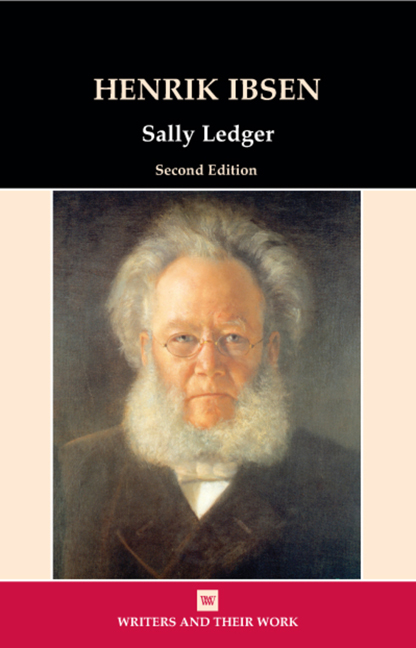Book contents
- Frontmatter
- Dedication
- Contents
- Acknowledgements
- Biographical Outline
- Note on Translations
- Abbreviations
- 1 Ibsenism and A Doll's House
- 2 Ibsen, Realism and ‘Modern’ Drama: From Norwegian Nationalism to Ghosts
- 3 Liberalism and its Discontents: Ibsen's Politics in An Enemy of the People
- 4 Ibsen's Women: The Lady from the Sea, Hedda Gabler and Little Eyolf
- 5 Ibsen, Freud and Psychological Drama: Rosmersholm and Peer Gynt
- 6 Beyond Realism: John Gabriel Borkman and When We Dead Awaken
- 7 Afterword: Ibsen Now
- Notes
- Select Bibliography
- Index
- Recent and Forthcoming Titles in the New Series of WRITERS AND THEIR WORK
3 - Liberalism and its Discontents: Ibsen's Politics in An Enemy of the People
- Frontmatter
- Dedication
- Contents
- Acknowledgements
- Biographical Outline
- Note on Translations
- Abbreviations
- 1 Ibsenism and A Doll's House
- 2 Ibsen, Realism and ‘Modern’ Drama: From Norwegian Nationalism to Ghosts
- 3 Liberalism and its Discontents: Ibsen's Politics in An Enemy of the People
- 4 Ibsen's Women: The Lady from the Sea, Hedda Gabler and Little Eyolf
- 5 Ibsen, Freud and Psychological Drama: Rosmersholm and Peer Gynt
- 6 Beyond Realism: John Gabriel Borkman and When We Dead Awaken
- 7 Afterword: Ibsen Now
- Notes
- Select Bibliography
- Index
- Recent and Forthcoming Titles in the New Series of WRITERS AND THEIR WORK
Summary
‘Ibsenism’ and Ibsen are not synonymous. Whilst George Bernard Shaw, Eleanor Marx and other Ibsenites in late- Victorian London hailed the Norwegian playwright as honorary spokesperson for their various socialistic causes, Ibsen himself was politically uncommitted, never joining any political party or supporting unequivocally a particular political faction. As Michael Meyer has wryly noted, the one political demonstration in which the Norwegian took part involved the defiant cheering of an elderly German, Havro Harring, who was deported from Christiania in May 1850 for writing a radical play. Living in Italy in 1867, the strongest feeling provoked in Ibsen by Garibaldi's invasion of Rome was a sense of irritation that the trains were no longer running on time. Never a sectarian in politics, he was, in his plays, essentially a liberal individualist, with Nora Helmer as his dramatic archetype (and this partly explains his appeal to late- Victorian feminism, which was very much a product of nineteenth- century Liberalism). Despite his often-cited speech to a workers’ procession in Trondheim on 14 June 1885, in which he had predicted that ‘The transformation of social conditions which is now being undertaken in the rest of Europe is very largely concerned with the future status of the workers and of women’, it is I think difficult to appropriate Ibsen's work for socialism in quite the way the Shavian Ibsenites of the 1880s and 1890s did. Ibsen was very much of the avant-garde in as much as that he wished to disrupt and overturn the social, political and aesthetic status quo and to enable the birth of a new order of things. But his was a completely non-aligned avant-gardism which cannot readily be identified with either the political ‘left’ or the political ‘right’. Whilst in The Pillars of Society (1877), for example, the object of attack is an extreme right-wing figure, in An Enemy of the People (1882) Ibsen turns on those mealy-mouthed liberals who had joined in the general condemnation of his naturalist play, Ghosts (1881), in the previous year.
The savage satire of An Enemy of the People is directed against the moral timidity – as Ibsen saw it – of the supposedly ‘progressive’ liberal press in Norway.
- Type
- Chapter
- Information
- Henrik Ibsen , pp. 26 - 32Publisher: Liverpool University PressPrint publication year: 2008



